Natalie Ward, FarnellMaking of micro:bit

Natalie Ward is the Manufacturing Manager for Farnell, responsible for the manufacture of the BBC micro:bit, Raspberry Pi and other single board computers.
The BBC micro:bit is manufactured by Farnell, an electronics distributor and part of Avnet. But distribution is not all that Farnell does. Farnell is also behind the manufacture of the Raspberry Pi and a range of associated accessories – so the BBC micro:bit is in good hands. Since becoming the exclusive licenced manufacturer of the BBC micro:bit in 2016, Farnell has manufactured over 4.5 million boards, which have been distributed across the globe.
The small device begins its design journey at the micro:bit Foundation. The micro:bit Foundation is a not-for-profit organisation which was founded in 2016 to inspire every child to create their best digital future, using the BBC micro:bit. Once the design is tested and approved, Farnell step in to bring the design to life, working with its experienced manufacturing partner, Embest, based in China.
There are 6 steps to the manufacturing process for any electronic component – and the BBC micro:bit is no different:
SMT (Surface Mount Technology)
Inspection
Reflow
X-ray
Final Inspection/Testing
Kitting
SMT
SMT is the stage where the required components are laid out on the bare board – this would include the chips that provide the processing power, LEDs and other components such as the compass. All components are listed within the BOM – the Bill of Materials – which is like a shopping list of all the components required. There are two stages to the process. First of all the parameters are set. This is done by referring to the design file to identify the co-ordinates where each component should be positioned, then the components are placed onto the PCB (printed circuit board) in the right positions.

Inspection
Once SMT is complete, the boards are manually inspected against the design files. Every single board is inspected – for part orientation (which way the parts have been added) and if any parts are missing or incorrect. There is also a 100% visual inspection against the customer’s design.
Reflow
Once it is determined that all the components are in the right positions, solder paste is applied to attach the components. This is called the reflow stage.

X-Ray
Next up, every BBC micro:bit is x-rayed. This process will show whether any solders are touching – a “solder bridge”, which would result in a short circuit of the board when used.

Final Inspection/Testing
Once all this is complete, each board is inspected again and subjected to various functionality testing to ensure the boards are working as they should, and look as they should.
Kitting and Shipping
Once the boards are approved as ready to go, the finished boards are packed into the boxes, either in singles, or in the range of packs that are available to buy – from the Go pack and Club Packs to the Bulk pack which includes 300 micro:bit for use in the classroom. The BBC micro:bit are then shipped to Farnell warehouses across the globe – in the UK, USA, China and Singapore, ready to send to customers.
That’s it! Now you know what goes into making a BBC micro:bit, from design to manufacturing all the way to a classroom near you.
